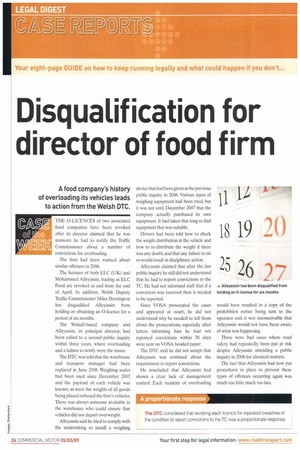isquatification for director of food firm
Page 26

If you've noticed an error in this article please click here to report it so we can fix it.
A food company's history of overloading its vehicles leads to action from the Welsh DTC.
THE 0-LICENCES of two associated food companies have been revoked after its director claimed that he was unaware he had to notify the Traffic Commissioner about a number of convictions for overloading.
The firm had been warned about similar offences in 2006.
The licences of both ELC (UK) and Mohammed Alleyassin, trading as ELC Food are revoked as and from the end of April. In addition, Welsh Deputy Traffic Commissioner Miles Dorrington has disqualified Alleyassin from holding or obtaining an 0-licence for a period of six months.
The Walsall-based company and Alleyassin, its principal director, had been called to a second public inquiry within three years, where overloading and a failure to notify were the issues The DTC was told that the warehouse and transport manager had been replaced in June 2008. Weighing scales had been used since December 2007, and the payload of each vehicle was known, as were the weights of all goods being placed onboard the firm's vehicles There was always someone available in the warehouse who could ensure that vehicles did not depart overweight.
Alleyassin said he tried to comply with the undertaking to install a weighing device that had been given at the previous public inquiry in 2006. Various types of weighing equipment had been tried, but it was not until December 2007 that the company actually purchased its own equipment. It had taken that long to find equipment that was suitable.
Drivers had been told how to check the weight distribution in the vehicle and how to re-distribute the weight if there was any doubt, and that any failure to do so would result in disciplinary action.
Alleyassin claimed that after the last public inquiry he still did not understand that he had to report convictions to the TC. He had not informed staff that if a conviction was received then it needed to be reported.
Since VOSA prosecuted the cases and appeared at court, he did not understand why he needed to tell them about the prosecutions, especially after letters informing him he had not reported convictions within 28 days were sent on VOSA headed paper.
The DTC said he did not accept that Alleyassin was confused about the requirement to report convictions.
He concluded that Alleyassin had shown a clear lack of management control. Each incident of overloading would have resulted in a copy of the prohibition notice being sent to the operator and, it was inconceivable that Alleyassin would not have been aware of what was happening.
These were bad cases where road safety had repeatedly been put at risk despite Alleyassin attending a public inquiry in 2006 for identical matters.
The fact that Alleyassin had now put procedures in place to prevent these types of offences occurring again was much too little much too late.
















































































































































